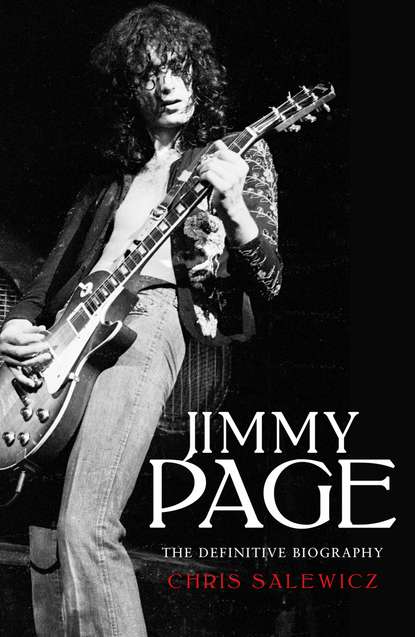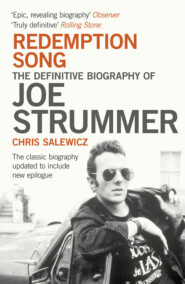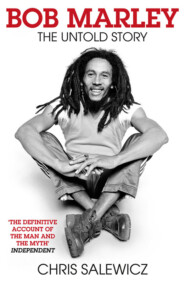По всем вопросам обращайтесь на: info@litportal.ru
(©) 2003-2024.
✖
Jimmy Page: The Definitive Biography
Настройки чтения
Размер шрифта
Высота строк
Поля
19 THE KENNETH ANGER CURSE (#litres_trial_promo)
20 FACE TO FACE (#litres_trial_promo)
21 THE RULES OF ENGAGEMENT (#litres_trial_promo)
22 BONZO’S LAST STAND (#litres_trial_promo)
23 THE HERMIT (#litres_trial_promo)
24 MIDDLE-AGED GUITAR GOD (#litres_trial_promo)
25 THE SORCERER’S APPRENTICE (#litres_trial_promo)
26 PHOENIX RISING (#litres_trial_promo)
Picture Section (#litres_trial_promo)
Sources (#litres_trial_promo)
Acknowledgements (#litres_trial_promo)
Index of Searchable Terms (#litres_trial_promo)
About the Publisher (#litres_trial_promo)
Preface (#u9f42648e-3e1c-5cb0-9932-1087e0f7fd79)
One chilly February evening in 1975, Jimmy Page journeyed in a black Cadillac limousine to David Bowie’s rented house on 20th Street in Manhattan. The Led Zeppelin leader and Bowie had known each other since the mid-sixties, Page having played on several of Bowie’s early records.
The pair were also linked through Lori Mattix, Page’s Los Angeles-based underage lover and a cause of considerable concern in the Zeppelin camp, thanks to the criminal complications this could create for the Biggest Band in the World. What few knew was that Bowie had taken Mattix’s virginity when she was just 14.
With the superstar pair having been reintroduced by Mick Jagger, Bowie had invited Page over to his place for an evening’s entertainment largely comprising lines of cocaine and glasses of red wine, along with Ava Cherry, Bowie’s girlfriend.
Mired in his Cracked Actor phase, Bowie was known to be living on milk and cocaine, and on the edge of madness. He had been inspired to devour the writings of Aleister Crowley, whose philosophy he had first dabbled in during the late 1960s: Bowie believed that Page’s deep knowledge of Crowley had enhanced the guitarist’s aura until it was rock hard and ringing with power.
But despite being intrigued, Bowie was extremely wary of Page. Conversation was somewhat stiff, although there was brief talk about Page’s progress, or lack of it, on the soundtrack to filmmaker Kenneth Anger’s occult masterpiece Lucifer Rising. Attempting to inquire how Page had developed his extreme aura, Bowie found his questions were never answered: Page would simply smile mysteriously.
‘It seemed that he did believe he had the power to control the universe,’ wrote Tony Zanetta, the head of Bowie’s management organisation MainMan, in his book Stardust. Besides, Page was only too aware that Bowie was picking his brain, endeavouring to crack a magician’s tricks.
At one point Bowie disappeared out of the room, and Page accidentally spilled red wine on a satin cushion. When the singer returned, Page tried to blame Ava Cherry, who wasn’t in the room.
His guest’s inscrutable behaviour had already rankled Bowie, and now he knew that Page was lying. ‘I’d like you to leave,’ he said.
Page’s response was simply to smile at Bowie. The window was open, and Bowie pointed at it, snapping his words out furiously: ‘Why don’t you leave by the window?’
Page remained sitting there, maintaining his enigmatic rictus smile, gazing through Bowie. Finally, the Led Zeppelin leader stood up silently, stepped towards the front door and left, shutting the door forcefully behind him.
Bowie was terrified. Immediately afterwards he ordered that the house be exorcised. A sensitive soul whose perceptions were addled by drugs, Bowie believed ‘it had become overrun with satanic demons whom Crowley’s disciples had summoned straight from hell’.
When he later ran into Page at a party, Bowie straightaway fled the event.
Introduction (#u9f42648e-3e1c-5cb0-9932-1087e0f7fd79)
John Bindon, Led Zeppelin’s security guard, had stagehand Jim Matzorkis pinned to the floor of a backstage trailer at Oakland Coliseum. Bindon, a sometime actor and London gangland heavy who had reputedly once bitten off a man’s testicles and would stab another man to death the following year, was viciously pummelling Matzorkis with his fists and feet. But it was only when Bindon started trying to gouge out the stagehand’s eyes that Matzorkis fully appreciated the danger he was in.
For much of this day of Saturday 23 July 1977 the possibility of such a grim outcome had been building. Many of Zeppelin and their crew seemed in a state of permanent rage, as if they had surrendered control to the large quantities of drugs consumed during the course of a 51-date tour that had begun on 1 April.
Later, Jimmy Page would be obliged to deny to me that what happened that day was karmic recompense for his flirtations with the occult. ‘I don’t think we were doing anything … evil,’ he said, two years later.
It was especially ironic that what happened at Oakland Coliseum that day, which would utterly transform the fortunes and career trajectory of Led Zeppelin, should be on the turf of Bill Graham, whose Fillmore West had been a temple of popularity for the Yardbirds, Page’s previous group, and, along with Graham’s New York showcase the Fillmore East, the scene of early break-out triumphs for Led Zeppelin. Although the confluence of the interests of Bill Graham and Peter Grant, Led Zeppelin’s manager, had proved mutually advantageous in the past, it was always a disaster waiting to happen. Graham was the most powerful music promoter in the United States; Grant had reinvented the relationship between managers and promoters in the United States, often through heavy-handed behaviour. And as much as Grant terrified people, Graham also possessed a fierce temper.
The previous evening, Graham, who was promoting Day on the Green, as this event was billed, for an audience of 65,000, had been summoned to Led Zeppelin’s hotel, the San Francisco Hilton, to honour a sudden demand for a $25,000 cash advance against their fee for the shows. Entering their suite, Graham noticed a cowboy-hat-wearing local dealer of hard drugs; in a flash he realised what the money was needed for.
Arriving only 20 minutes before the start of the gig, Page was so evidently befuddled from his drug consumption, by that stage largely heroin, that Graham could only watch as the Led Zeppelin leader set off for the stage in entirely the wrong direction; he was rescued by an aide who stopped him and despatched him on the correct course. Midway through the set Bindon crawled out onto the stage on his hands and knees and licked Page’s boots.
As the wheezing, out-of-shape man-mountain that was Peter Grant lumbered up to the stage, Jim Downey, a member of the stage crew, commiserated with him about the excessively steep climb. For this presumption Bindon, who was accompanying Grant, punched Downey with such force that he slammed him into a concrete pillar and knocked him out.
‘What happened? The fuck did I do?’ wondered the victim as he came to. Downey was clearly unaware of an extraordinary management edict – egregiously pathetic in its arrogance – on what would become the final Led Zeppelin American tour: no one was permitted to speak to any member of the act, or to Grant, unless they were first spoken to. (Flying on the group’s plane, journalist Steven Rosen had been made fully aware of this. He was startled when the normally benign bass player, John Paul Jones, had verbally assaulted him, demanding all of his interview tapes – a response to an apparently unfavourable comparison of Zeppelin to the Jeff Beck Group that Rosen had made years previously. This incident was indicative of the prevailing mood on the tour.)
‘What I didn’t like about Led Zeppelin was that they came with force,’ Graham wrote later. ‘I had heard stories from other cities about how they had muscled promoters to get better deals. How they had shaken them down for money … I had heard about the ugliness of their security.’
But far worse was to come. Midway through Led Zeppelin’s show, during Page’s acoustic set, Matzorkis noticed a young boy removing wooden plaques from the doors of the dressing-room trailers: plaques that had the names of the artists on them, and which would be required for the repeat show the following day. Also on the bill, as support acts, were Judas Priest and Rick Derringer. Matzorkis told the kid to put them back. The kid was insistent that he would be taking them. So Matzorkis took them from him – allegedly cuffing him round the back of the head, although Matzorkis has always denied this – and wandered over to the storage trailer to lock them away. Unbeknown to Matzorkis, the boy was Warren Grant, the 11-year-old son of Peter Grant.
A few minutes later Matzorkis was still in the storage trailer when John Bonham, Led Zeppelin’s drummer – surplus to requirements during Page’s acoustic set – called to him from the bottom of the short flight of steps outside it. Peter Grant was with him.
‘You don’t talk to my kid that way,’ Grant said, as Matzorkis stood in the trailer’s doorway. The burly Bonham, an effigy of muscle and blubbery booze-fat, simply stood there, as though he was Grant’s security wingman. Then Grant escalated matters, like the barrack-room lawyer and bully he could be: ‘You don’t talk to my kid that way. Nobody does. I can have your job.’ Grant continued in this vein, accusing Matzorkis of ‘roughing this kid up. I heard you hit this child.’
Stepping up the stairs, Bonham then kicked Matzorkis between the legs, sending the stagehand flying back into the trailer. Bonham followed him in, while a pair of bodyguards endeavoured to restrain the drummer, shouting at Matzorkis to get out of there. He did, through a rear door.
When he learned of the incident, Graham went to find Grant in his trailer. For 20 minutes Graham put up a spirited defence of Matzorkis, yet Grant refused to budge from his thinking: ‘Your man put his hands on my people. On my son. How could you let this happen? How could you hire these people? I’m very disappointed in you.’
‘Let me speak to this man,’ Grant repeatedly demanded. When Grant finally insisted that all he wanted was to meet again with ‘the man’ who had caused these problems to ‘make my peace with him’, Graham somewhat reluctantly agreed to the manager’s request.
Walking over to find Matzorkis in another trailer, Graham observed that Grant was now flanked by a pair of other men; one of them was Bindon.
When Graham introduced Grant to Matzorkis, Led Zeppelin’s manager seized the stagehand, yanked him towards him and smashed him full in the face with a ring-covered fist, knocking him back into his seat. When Graham lunged at Grant, one of the security men picked up the promoter, threw him down the steps and shut the door of the trailer, standing guard in front of it.
Inside the trailer Bindon held Matzorkis from behind, while Grant started to work him over, punching him ceaselessly in the face, knocking out a tooth and kicking him in the balls.
Somehow, Matzorkis, who was screaming for help, broke free of Bindon. He managed to manoeuvre himself to the rear of the trailer, but this was when Bindon leapt upon him and went for his eyes. Fuelled by adrenaline, Matzorkis finally twisted away and got to the door.
Despite the security man guarding it, Matzorkis managed to get out of the trailer and run off across the backstage area.
Meanwhile, tour manager Richard Cole, armed with a chunk of metal pipe, had been attempting to enter the trailer. Bob Barsotti, who with his brother served as Bill Graham’s creative director, had prevented him, so he then turned on him. Realising that Cole was demented from the drugs he had seen him consuming during the day, Barsotti ran off, leading him on a merry dance down into the car park, where Cole ran out of steam.
By now several of Graham’s security men had gone to retrieve their ‘pieces’ from where they were stashed in their cars’ boots, but a seasoned member of the backstage crew reminded all concerned that the next day there would be another Led Zeppelin show: if the group did not play, 65,000 fans might very well riot. Yet the Graham crew consensus was that somehow the next day they would ‘deal’ with Zeppelin and their team. The promoter agreed with this thinking. He also made an offer: if they couldn’t ‘do’ Led Zeppelin and their cohorts the next day, then he would personally fly 25 of his men to New Orleans, the next date on the tour, and they could mete out revenge there.
At Graham’s home that evening, where the promoter had taken Matzorkis for protection following his release from hospital, he received a call from Led Zeppelin’s US lawyer: he demanded that Matzorkis sign an indemnity waiver, giving Led Zeppelin protection against being sued over what he referred to as a ‘minor altercation’. Unless this was received, Led Zeppelin ‘would find it difficult to play’ the next day.







